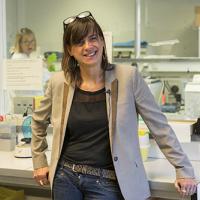
Food, Global Health Reading time 6 min
Sophie Layé, masterminds
Published on 08 December 2015
“Welcome to the chateau”! Everyone knows her by the sound of her step, as her heels click the grey-blue linoleum floors of the long hallways of the University of Bordeaux. From floor to floor, wherever there is an open door, there is Sophie Layé, arriving in a whirlwind of words and gestures. She’ll only stay a few minutes, to discuss something on the fly or ask a question before leaving in a friendly flurry. “She’s a super dynamic leader with everything it takes to run this lab”, says Lucile Capuron, her colleague of ten years who co-directs the Psychoneuroimmunology and Nutrition team. “I love working with her”.
Protecting neurons
The thirty-something students at the lab, whom Sophie says are her masterminds, feel the same way. Following her lead, they are laying the foundations of a new and innovative discipline at the crossroads between nutrition and neuroscience. “Through research, we are trying to bring objective data to the table on the impact of nutrition, and particularly of certain micronutrients such as polyunsaturated fatty acids, on the brain and on an individual’s well-being”.
Diverse skill sets, social issues… INRA said, you’re on!
The pace has slowed down a bit, the action is more posed and purposeful. Words are weighed, very carefully weighed. After a career as lecturer in neuro-endocrinology, Sophie came on board at INRA as a researcher in 2003. Today, she is pursuing translational research on humans and animals: “We created the international summer school to teach students and professionals about health in different metabolic states such as obesity, and how certain components of food and diet affect stress, memory and depression”.
Autonomy is paramount
When Sophie speaks about her work, the personal development and autonomy of her colleagues is foremost in her mind. When it comes to Robert Dantzer, her thesis advisor and expert in human emotions and the relationship between stress and disease, she is overcome by a mixture of mischief and tenderness. “Robert is a very discreet man, just the opposite of me… But he was always ready and willing to help us reach our common goal”. Sophie requires that her team publish on a regular basis, but above all defends the pleasure principle as the ultimate driving force of all achievement. Everyone knows where to reach Sophie at all times. Even when she is half way around the world forging international partnerships for the International Associated Laboratory (LIA) Optinutribrain, which she created in 2014. “Now all of that must thrive!” she says with a sense of urgency.
Helping the brain grow old gracefully
Often on the go, always on the move: that’s Sophie. Even late at night, on her bicycle, on her way to her piloxing class to cleanse herself of the day’s tobacco intake. After an 18-year break, cigarettes have once again become her anti-stress, at the same time she took over the direction of the unit. Everyone around here knows that tall friendly Sophie works hard to foster and promote her lab’s research on a constant basis, to justify the confidence placed in her and means invested. “There are thousands of questions yet to be answered about the nutritional lives of people. During the developmental stages, and particularly pre-natal nutrition”. Sophie speaks of the future of her research with relish and indulgence: explore new avenues, predict future challenges in nutrition and help the brain grow old more gracefully… so that memories linger longer.
CV in brief
- 49 years, 3 children
- At INRA since 2003
- Director of the NeutriNeuro laboratory since 2011
- Co-director of the International Associated Laboratory OptiNutribrain since 2014
Award
- Recipient of the 2015 INRA Scientific Breakthrough Award
What's next?
Sophie Layé waxes poetic when it comes to the future of her research and her field. Her commitment runs deep, and her passion is palpable when the topic turns to the developmental stages of life. “The first is the peri-natal stage, when a baby’s brain is developing. The second is adolescence, when certain brain structures finish maturing. We are taking a particularly close look at microglial cells that allow neurons to create connections with each other. These two stages of life are of interest to us because they are moments of nutritional disruption. In the first case, it’s the beginning of lactation. In the second, adolescents often adopt poor diets, too high in fat and sugar, which can harm maturing brain structures and make them more vulnerable to stress and aging”.
Up close
The International Associated Laboratory, OptiNutribrain
Brain disease (neuropsychiatric and neurodegenerative) is on the rise, and science must gain a better understanding of its aetiology (causes and factors of a disease). To rise to this lofty challenge, Sophie Layé and her team created a research consortium in Bordeaux and joined forces with INAF (Institute of Nutrition and Functional Foods, Université Laval, Québec), the biggest research group for nutrition in Canada. “We got funding at national and international level, and have student and research exchanges with Frédéric Calon’s team. Frédéric is an expert in nutrition and neurodegenerative disease (Alzheimer’s). We have common interests and his skills are complimentary to ours. It’s a perfect match”! The creation of an International Associated Laboratory was the next logical step to formalise shared efforts, increase visibility, particularly on the international scene, and foster relationship-building among different players (world of research, civil society, industrial players). “The creation of the LIA OptiNutribrain”, explains Sophie Layé, “goes beyond providing a legal and functional framework for actions taken at international level with many partners. It gives impetus to and creates an extra boost for other, more ambitious, projects”.
